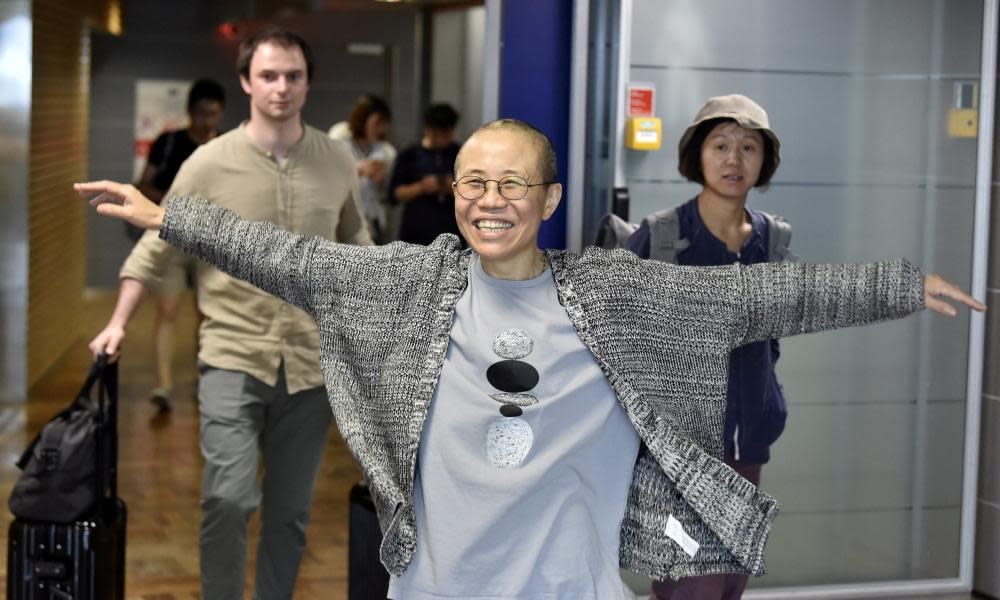Liu Xia: free at last but a hostage-in-exile to Beijing’s crackdown

As hundreds of people gathered in Berlin’s Gethsemane church to remember and celebrate Chinese activist Liu Xiaobo – the writer and Nobel peace prize laureate – on the first anniversary of his death, one slight woman was conspicuous by her absence.
His widow, poet Liu Xia, had landed in the German capital just days earlier, after her surprise release from nearly eight years of house arrest in Beijing. But although she has been allowed to leave after years of protests and petitions, she is still not totally free. Berlin-based friend Tienchi Martin-Liao, who had been Liu Xiaobo’s editor, said she was not able to appear in public or speak to media because of worries about her brother Liu Hui, who is still in China.
“It’s not really her will. She is free, but she still cannot enjoy complete freedom because her brother is still in Beijing in the hands of the government,” she said.
Liu Xia originally insisted she would not leave China without her brother, who was convicted on fraud charges over a property dispute in 2013, in a case activists believed to be retribution against the family.
Martin-Liao stopped short of saying Liu had been threatened about the consequences for her brother if she were to speak publicly, but fellow writers and activists agree that he is being held to ensure her compliance. It is a tactic they fear is being used more often to hobble dissident communities abroad, even as China’s fast-growing wealth and political influence has made it easier for the government to ignore calls to free jailed opponents.
“The Chinese Communist party has become more immune to international pressure to release activists and let them go overseas, coinciding with its growing economic clout,” said Frances Eve, a researcher at Chinese Human Rights Defenders. “Nowadays, on the rare occasion it does allow an activist to go abroad, it’s with the sinister knowledge that their immediate or extended family remains in China and can be used as an effective hostage to stifle their free speech,” said Eve.
So as friends, allies and colleagues gathered for songs, speeches and tributes, exactly one year after Liu Xiaobo’s death in custody from liver cancer, Liu Xia stayed at home to remember her late husband in private.
“She was not totally alone. In a very quiet atmosphere, she had a dialogue with Liu Xiaobo. In her way, very quietly she touched him,” said Martin-Liao, who has spoken regularly with Liu Xia over the phone for nearly a decade but only met her in person last week.
Liu had effectively been under house arrest since 2010 after her husband was awarded the Nobel peace prize in absentia. He was jailed in 2009 for his hand in writing a political manifesto, Charter 08, calling for peaceful political reform and the end of one-party rule.
Liu died in 2017 of liver cancer after being denied permission to leave the country for medical treatment. Liu Xia herself was never charged with any crime but Chinese authorities apparently feared she could become a figurehead for protestors. She was restricted to her Beijing apartment, where she was kept virtually incommunicado and under heavy surveillance, occasionally allowed to leave for short trips or receive visitors, but denied a passport. She battled severe depression and threatened to kill herself earlier this year, so news of her surprise release was greeted with joy by friends and activists.
But they warned that her sudden freedom should be celebrated as a unique success, not as a sign of broader progress for human rights as President Xi Jinping presides over a long crackdown on activists and civil society. “It should be said very clearly, the human rights situation is deteriorating and is as bad as before,” Martin-Liao said.
A harsh jail sentence handed down to another dissident the day after Liu’s departure appeared to underline the government’s position. A court in central Wuhan city sentenced 64-year-old Qin Yongmin to 13 years in prison for subversion.
When Qin, who has been pushing for democratic reforms since the 1970s, is released, he will have served almost half of his life, or 35 years, in prison. Last week also marked the anniversary of the “709 crackdown” where more than 300 lawyers and activists were imprisoned, tortured, or disappeared.
Within China, friends of Liu Xiaobo and Liu Xia were also taken on forced vacations to keep them from staging any memorials. “Nothing has really changed,” says Wen Kejian, a writer and activist friend of the couple.
Liu’s release has been widely attributed to pressure and negotiations from the German government, and some have taken that as proof that public campaigns and diplomatic pressure do work. But Wen attributes it more to China’s need for allies in Europe during a time of tension with the US. “China has become more and more stubborn and more aggressive to push for its own agenda. Diplomatic pressure or public opinion really don’t mean as much as they used to,” Wen said.
The venue for the Berlin memorial service, the Gethsemane church, was a hotspot for East German dissidents during the cold war. Those attending including novelist Herta Müller, a winner of the 2009 Nobel prize for literature, former German president Joachim Gauck, Berlin-based Chinese dissident novelist Liao Yiwu and a host of other human rights activists. And although Liu Xia did not attend, she did send a message of thanks for her unexpected escape, asking the friend who read it out to convey her “deep gratitude to the German government and perhaps, as its representative, Angela Merkel”.
The German government has so far not directly confirmed or commented on its role in brokering a deal to allow the poet and artist to leave the country, but supporters of Liu Xiaobo and Liu Xia said the chancellor’s consistent behind-the-scenes lobbying had played a crucial role.

 Yahoo News
Yahoo News 
